There is an unwritten phenomenon in the industry. Before the release of a new generation of operating systems, PC makers will experience a difficult dark time. Regardless of whether or not the company is willing to admit such a fact, it shows a complete picture of the comparison between the major PC makers and Apple’s recent financial report data.
"Apple's momentum is too fierce. PC manufacturers must unite and fight against Apple." A PC maker's executives lamented after seeing Apple's earnings. In April 2012, Apple released its second quarter report, which is another best-performing quarter in Apple's history. Data show that as of March 31, in the past quarter, Apple's revenue reached 39.19 billion US dollars, an increase of 59%; net profit of 11.6 billion US dollars, an increase of 94%.
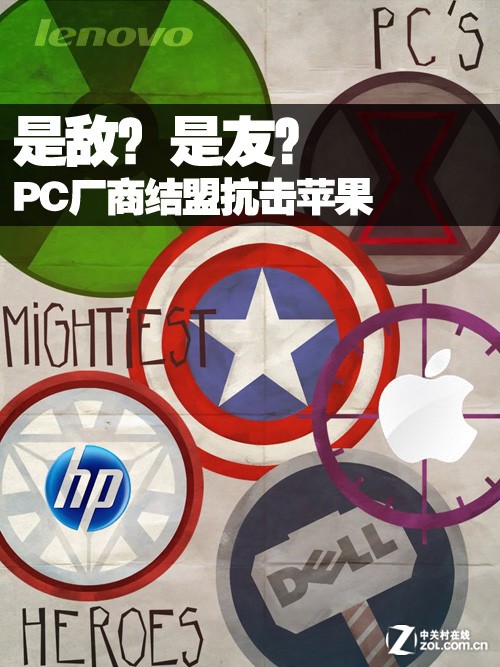
PC Vendors Avengers Fight Apple
In stark contrast to this is PC boss Hewlett-Packard. HP's financial report released in the same period shows that in the past quarter, HP net revenue was 30.7 billion US dollars, down 3% over the same period last year, 31.6 billion US dollars; net profit of 1.6 billion US dollars, down from 2.3 billion US dollars in the same period last year 31%.
To make matters worse, in response to shrinking profits, Hewlett-Packard announced a new quarterly earnings report while announcing a massive layoff plan for 25,000 to 30,000 employees. These employees account for about 9% of the total number of employees at the California headquarters. HP hopes to save more than US$3 billion in funds each year. Fortunately, HP CEO Whitman subsequently said that HP will retain PC business and will continue to focus on hardware. Whitman is eager to stabilize the military.
Dell also reported earnings in the same period. The transcript of "4% revenue decline and 33% decline in net profit" is exactly the same as that of HP.
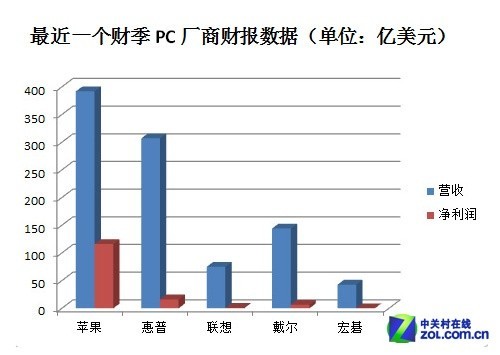
PC manufacturer’s financial report data for the most recent quarter (unit: US$100 million)
"PC makers will face a difficult period." Peter Misek, an analyst at Jefferies, an investment company, predicts that the global PC market will decline this year. It is expected that in the next third quarter, global PC shipments will decline by 5% to 10%. Analysts pointed out that before the release of Windows 8, the entire PC market will be in a steady decline. After the release of the new system in the fourth quarter of this year, it will not be known whether it will usher in a surge of PC upgrades.
The spread of apple tentacles must be killed
Just as the PC industry was having a bad year, Apple's branches are expanding. After the iPhone and the iPad laid a solid foundation for Apple's position in the IT world, people gradually developed a good impression on the Mac. Awful, this goodwill is spreading to the corporate market.
"USA TODAY" recently reported that "in various parts of the United States, Apple is hiring sales staff to put their products into more Fortune's top 100 companies." "Apple directly provides products for enterprises without passing Apple Store purchases.†Apple’s preferential policies for businesses show its clues to the corporate market. Another sign is that Apple is promoting iPads for corporate employees. This seems to be a springboard for Apple to enter the corporate market. You know, most of the current enterprise software does not support the Mac system. However, the iPad is supported by a large number of APPs and can perform simple and fast presentations and inquiries. It is very easy to get approval from corporate customers.
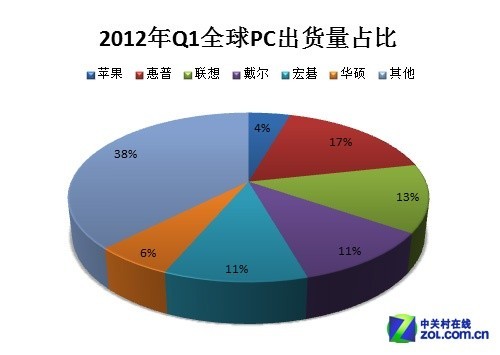
Q1 global PC shipments in 2012
A survey by the NPD pointed out that 73% of SMEs plan to purchase tablet devices within the next year. Among them, 89% of companies with more than 500 employees said that they will purchase tablet devices, and the iPad will be the first choice. "Mobile technology is rapidly changing the nature of business. For companies, this is an excellent opportunity to develop new customer, employee, and shareholder interaction models." Analysts said.
Fortunately, Apple’s current share of the market is not high, although it has a large expansion, but the base is very small. According to the latest data published by the authoritative market research organization Net Applications, as of May 2012, the share of Mac in the market occupies 6.44% of all PCs, not enough to become a big climate. In contrast, Windows PC accounted for as high as 93%, and it is firmly in the first place. Even so, PC makers have long been feeling crippling in seeing such a crazy spread of Apple.
·Humanity is a strategic alliance between the PC camp and the PC camp
In the face of Apple's invasion, Acer Computer's senior vice president and president of Greater China Lin Xianlang was optimistic about the PC market. "PC will not die, because PC is defined as two major functions, one is the function of education, because any country is not willing to lose in education, as long as the existence of educational products, PC will not die. Second, as long as the company The PC will not be separated, so the PC will not die." At the COMPUTEX computer show held in Taipei not long ago, Lin Xianlang told ZOL reporters that although Acer and Lenovo are competitors in the PC market, they have resisted the invasion of Apple. On the Other hand, both are close comrades.
It can be seen that in the face of Apple's ferocious impact, Baotuan resistance has become the best policy for PC manufacturers. Ever since, PC makers will form the Avengers Alliance to resist Apple and defend the PC market. Just like the movie, heroes of each way took out their respective skills and joined forces to resist the invasion of foreign enemies.
Alliance! The best way to resist Apple
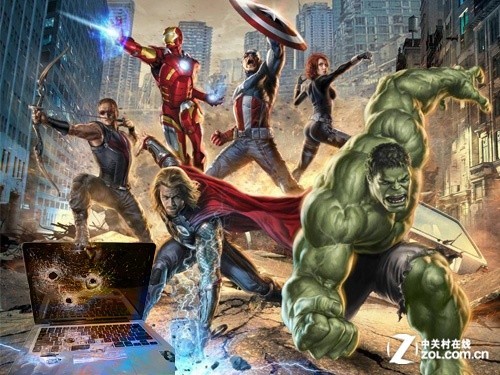
PC makers have divided Apple's four weaknesses
A: Lenovo instigates Apple's overall desktop position to dominate emerging markets
As the world's second-largest PC maker, Lenovo has played a pivotal role in resisting Apple's army. For Apple, Lenovo’s most aggressive weapon is one desktop. Data show that in 2011, Apple iMac sold 3.7 million units, and Lenovo’s desktop sales totaled 2.4 million units in the same period. However, Lenovo’s growth is fast and it is expected that Apple’s iMac sales will grow steadily to 3.8 million units throughout 2012, but Lenovo will reach 4 million units, surpassing Apple’s.
"Apple is currently the world's largest integrated PC (integrated desktop) manufacturer, but in 2012 may be replaced by Lenovo." Taiwan "Business Times" analysis, Lenovo one desktop hardware is excellent, lower prices, compared to iMac With more options and other advantages, it is very likely that Lenovo will replace Apple's position on the all-in-one desktop in 2012.
Another irreplaceable advantage of Lenovo is its concern in emerging markets. According to a recent market research report from Citigroup, Lenovo’s demand in China’s inland cities 1-6 has been strong, with double-digit growth year-on-year, and users of first-time computers in inland areas have confidence in Lenovo’s brand and services. The company’s income ratio between the coast and inland has reached 50:50.

Lenovo's integrated desktop has already sold to China's inland cities of 4 to 6 (data map)
In overseas emerging markets, Lenovo is accelerating market expansion in India, Indonesia, Brazil, Argentina and Mexico and has become the largest PC brand in the Indian market. In the relative downturn of the traditional PC market, Lenovo's performance was amazing. In the first quarter ended March 31, Lenovo's PC shipments in the Chinese market increased by 23%, while it increased by 50% in other emerging markets.
Taking the example of Brazil, the third largest PC market after China and the United States, Lenovo has just announced its plan to build a production base in Brazil. It will also carry out a purchase plan in Brazil to reduce the sales price of its products in Brazil, and expand at the same time. Its market share in Brazil. In contrast, Apple is not much interested in Brazil. Brazilians pay more than 50% of the cost of buying an Apple product compared to Chinese mainlanders, and 71% more than Hong Kong people. This includes ICMS transaction tax, 9% social security tax, industrial product tax and import tariff that are required for imported products. Brazilians in developing countries can have several products that can afford Apple products.
Acer ASUS's supply chain responds quickly
As a representative of the Taiwan PC brand, Acer and Asustek have unique regional advantages. At present, the Taiwan region holds the upstream supply chain of the global PC industry. Large-scale appearance of the mold, display, small chip, capacitance, these components are from Taiwanese manufacturers. In addition, Hon Hai, Heshuo, Quanta, Compal, Wistron, Inventec and other electronic commercial and industrial agencies are located throughout Taiwan. It can be said that Taiwan already has a complete set of PC manufacturing environment. Once there are new product designs and moldings, it must be the first Taiwanese manufacturer to be able to ship in batches.
The more important point is that due to the overlapping of Acer, Asus and Apple's upstream supply chain and foundry business, Apple's every move will be the first among PC makers in Taiwan due to the close relationship between the supply chain and local PC manufacturers. Time found. Remember the MacBook Pro with Apple's just released Retina display? Ultra-high-definition display is breathtaking. But recall, just a few weeks before the release of Retina MacBook Pro, the ZOL Testing Center once received ASUS's 11-inch Ultrabook UX21A based on a 1080p display, which is enough to compete with the subsequent release of the Retina MacBook Pro. Maybe this is not a pure coincidence?
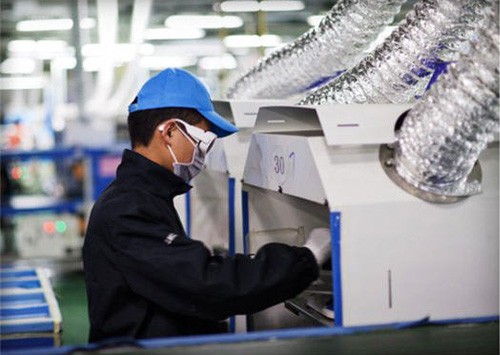
Taiwan's generation of industrially developed local PC makers near water tower (picture from the Internet)
HP, Dell defend the commercial market
The advantages of HP and Dell mentioned in the previous paragraph are exactly in the commercial market. HP CEO Whitman announced at a recent Global Technology Impact Summit in Shanghai that while focusing on hardware, HP will also focus on cloud services, big data, and security. This is actually a magic weapon for HP to win in the future. Compared to Dell, which is also focused on the commercial market, it has already announced that it will dilute the PC business. "Dell is no longer a PC company." Dell CEO Michael Dell mentioned this point more than once.
An HP executive revealed that HP is most worried about PCs in the commercial space. At present, the BYOD (portable personal device) method has been recognized by many companies, and employees can carry their own computers and mobile phones. Due to the huge influence of Apple among consumers, many MacBooks, iPads, and iPhones have gradually penetrated into the commercial field with the BYOD trend. If this trend continues, due to the interoperability of the same brand, Mac is likely to enter the commercial market on a large scale. Once this statement is made, the sales and profits of all other commercial PCs will plummet, with disastrous consequences.
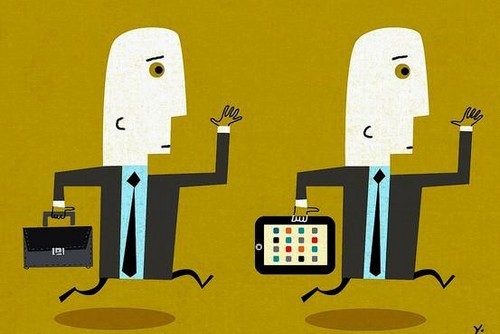
BYOD (Personal Equipment Office) has been approved by many companies (pictures from the Internet)
Fortunately, Apple’s share in the enterprise market is minimal. According to market research company data, 85% of companies currently use Windows PCs, and 60% of companies do not allow employees to use Mac computers. This is not an enterprise's disapproval of Apple, but most professional office software cannot be used on Mac systems. In addition, Apple's products are extremely closed, with unique interfaces, scalability, and functionality than PCs are in a weak position. These products that appear perfect to Apple and ordinary consumers, corporate buyers do not buy it.
Japanese and South Korean manufacturers take a new look at new technologies
The creativity and R&D capabilities of Japanese and South Korean PC companies are globally top-notch. Earlier, we had seen Sony's flashy 3D notebook VAIO F219, Toshiba's first naked-eye 3D notebook Qosmio F750, dual-screen notebook Libretto W100, and Samsung ultra-thin notebook 9 series. These products are our eyes. The appearance of these products may be telling us that users who want to experience avant-garde technology cannot be found in Apple's products anyway.
As we all know, Apple's products have a long-term lag in the replacement, and less and less disruptive updates. The superficial configuration upgrade simply cannot satisfy consumers who are constantly pursuing new technology products. From this point of view, the advantages of Japanese and Korean companies in R&D, design, and patents have brought Apple a lot of resistance.
The PC companies that looked like they were hostile to each other, faced with such a powerful foreign enemy as Apple, came together tacitly and formed a coalition against the invaders. In the short term, PC makers will temporarily retain some positions and block Apple’s mad expansion with their own advantages. In the long run, PC vendors can collaborate through a common partner, Microsoft. In terms of operating systems, they lock users with Windows' strong compatibility and penetration. However, the reality that must be faced beforehand is that before the launch of Windows 8 as a new operating system, the entire PC market will still face a period of immersion...
Motorola radio walkie talkies are a popular communication device used for both personal and professional purposes. These handheld radios provide a convenient and reliable means of communication, especially in situations where cellular networks may not be available or reliable. With a range of features and capabilities, Motorola walkie talkies are designed to meet the diverse needs of users. They are commonly used in industries such as construction, security, event management, and outdoor activities. The radios come in various models, offering different ranges, battery life, and durability options. With their ease of use, durability, and clear audio quality, Motorola walkie talkies have become a trusted choice for effective and efficient communication in various settings.
Motorola Radio,Motorola Two Way Radios,Motorola Talkabout Radios,Motorola Handheld Radio
Guangzhou Etmy Technology Co., Ltd. , https://www.digitaltalkie.com